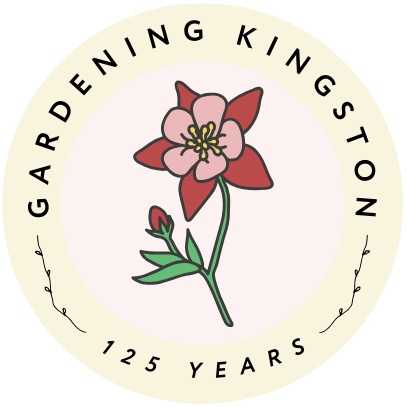
The idea to create a pollinator garden in Kingston was inspired by media reports of pollinator decline and by projects in other communities, notably Guelph and Ottawa.
A member of the Kingston Horticultural Society asked the question – “why not Kingston?” As a leader in sustainability, Kingston is an ideal place to bring together groups and individuals who can research the issue, educate the public and increase naturalized planting on public and private lands.
Our project was born in late 2010 with a small committee developing the plan for a demonstration garden. The garden would be relatively small but would serve as an example to the public at large; hopefully inspiring multiple “Pollinator Patches” across the city.
- We approached the City of Kingston for permission to use space in a visible public place and were delighted when we got approval to create a garden at the Memorial Centre. Our site is on the Nelson Street side of the perimeter pathway.
- February 2011—a Pollinator Workshop involved members of the Kingston Horticultural Society in a brainstorming session to generate ideas about direction of the project and potential partners.
- March 2011 – the Kingston Horticultural Society booth at the Gardening Festival featured photos of pollinators and native plants, samples of a Bee Bungalow, Butterfly Condo and Bat House. Handouts about Pollinator Friendly Gardening were distributed.
- August 2011 – The garden site was approved under the City’s Community Garden Policy.
- September 2011 – The site was prepared using a top quality garden mix, weed barrier and mulch for a good base and low maintenance. The first phase of planting was completed by members of the Kingston Horticultural Society. A crew of volunteers provided TLC – monitoring and watering as needed; waiting for our small specimens to take hold and grow, keeping in mind that most perennials take 2-3 years to establish themselves and make a show. We were happy to see bees and butterflies visiting within hours of the planting!
- Initial Plantings were closely watched. Volunteers checked in weekly and carried water in jugs and buckets. We were pleasantly surprised at how quickly our plants took hold. They flourished right before our eyes.
- By 2014, the garden exceeded our expectations. Minimal maintenance was required.
- In 2017 Kingston’s Pollinator Garden was recognized as a Pollinator Haven by the Ontario Horticultural Association, one of the first in the province. Since that time, dozens more Pollinator Gardens have been planted across Ontario and across the globe. Google to see how many…..they are definitely trendy!
- 2021 Update: what we’ve learned since the original planting in 2011. Some plants have exceeded our expectations and some have succumbed to weeks of hot dry conditions. The plan was to showcase hardy pollinator-friendly plants that you might introduce to your own garden. We now have experience to add to our recommended plant list. Look for links to individual plants for information. As our garden is designed to provide continuous bloom, a weekly walk-by is the best way to appreciate the diversity.
- Here’s an example of a change of heart based on actual experience: the Cup Plant – siliphium perfoliatum has been removed from the Pollinator Garden. Growing from a 12 inch seedling to an 8+ft. monster requiring staking; it definitely attracted pollinators but would only be suited to a large property, not your average city lot. Volunteers dug up the mother plant in 2019 but we are still finding self-sown babies everywhere…too much of a good thing!

Kingston Horticultural Society thanks:
- City of Kingston for their co-operation, support and start-up funding
- Ontario Horticultural Association for a Special Project Grant
- Kingston Field Naturalists for their help
- Lemoine Point Native Plant Nursery
- Members who donated plants, planted and continue to maintain the garden
More info:
Pollinator-friendly Gardening Tips


Amending the soil was a critical feature of preparing the site for the first phase of planting in September 2011


